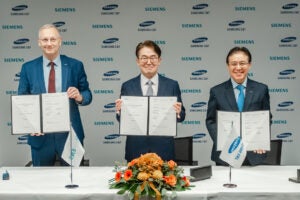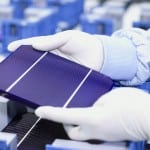The U.S. on Tuesday issued a new final determination affirming that some crystalline silicon photovoltaic (PV) products from China and Taiwan have been sold at dumping margins of between 11% and 165%.
The final determination from the Department of Commerce stems from anti-dumping duty and countervailing duty investigations covering a category of cells, modules, laminates, and panels assembled in China (but not produced there) and produced in Taiwan that are made from crystalline silicon PV cells of thickness equal to or greater than 20 micrometers. It does not include thin-film products produced from amorphous silicon, cadmium telluride, and copper indium gallium selenide.
The U.S. imported the specified cells, modules, laminates, and panels at a value worth about $1.5 billion from China in 2013, according to the International Trade Administration. That figure has dropped substantially from the $3.12 billion value reported in 2011. Comparatively, Taiwan’s import value was $657 million in 2013, up from $257 million in 2011.
The Commerce Department on Tuesday determined that Chinese PV component makers Trina Solar, Renesola Jiangsu, and Jinko Solar would receive final dumping margins of between 26% and 78%. About 43 other exporters qualified for a separate rate of 52%, while the “China-wide entity”—which Commerce said had not fully cooperated in the investigation—got a final dumping margin of 165.04%. The agency also determined that Trina Solar, Wuxi Suntech Power, and a number of affiliates received countervailable subsidies of up to 49.79%, while other Chinese producers and exporters received a final subsidy rate of 38.72%.
Imports of the products from Taiwanese firms Gintech Energy Corp. and Motech Industries received margins of 27.55% and 11.45% respectively, while other producers and exporters from the country received a final dumping margin of about 19.5%.
Customs to Begin Collecting Cash as Decision From ITC Awaited
The determination means that U.S. Customs and Border Protection will begin collecting cash deposits equal to the weighted-average dumping margins. However, if the International Trade Commission—another agency that is involved in U.S. trade remedy investigations—finds that the imports do not materially injure (or do not threaten to injure) U.S. industry, Commerce will terminate all investigations and stop subjecting producers and exporters to future cash deposits for either anti-dumping or countervailing duties—and possibly even refund collected cash deposits. The ITC could make its determination by Jan. 29, 2015.
Tuesday’s final determination follows a June 2014 preliminary decision by the U.S. Department of Commerce to impose anti-subsidy duties against U.S. imports of Chinese solar technology products.
Solar product manufacturer SolarWorld, a German firm whose U.S. arm is based in Hillsboro, Ore., filed the petition that initiated a federal investigation. The company objected to “illegal Chinese government intervention in the U.S. solar market.”
The Broader Policy Question
It is unclear how the determination will play out for broader policy cooperation agreements between the U.S. and China. This November, the two countries announced plans to cut carbon emissions and agreed to strengthen joint institutions to boost their renewable energy capacities.
The Coalition for Affordable Energy, a trade group whose members include about 100 solar firms, including Trina Solar, said in a statement on Tuesday that the determination to “tax solar panels from China, even those with key components made in the U.S.,” would “inhibit competition and put upward pressure on solar panel prices needed by U.S. homeowners, installers, utilities.”
The World Trade Organization (WTO) appellate body is, meanwhile, poised to release a report after hearing appeals from both the U.S. and China this fall in a case that focuses on 17 countervailing duty investigations that the U.S. Commerce Department conducted from 2007 through 2012 on products that include solar panels and wind turbines.
The appeals stem from a finding by a WTO dispute panel in July that the U.S. was largely in violation of global trade rules when it initiated a series of countervailing duty investigations against Chinese exporters. Beijing contested the Commerce Department’s findings in 12 of the 17 investigations that certain state-owned enterprises could be defined as “public bodies” within terms set out by the WTO’s 1995-established Subsidies and Countervailing Measures Agreement. All 160 countries that are members of the global international organization dealing with trade between nations must abide by its agreements.
Over recent years, solar trade spats have escalated among a number of key players. Though the European Union (EU) last year reached a settlement with Beijing over provisional anti-dumping duties, this June industry group EU ProSun asked the European Commission to investigate whether Chinese solar producers are violating the price undertaking deal. The measure follows the 28-country bloc’s decision to impose anti-dumping and countervailing duties on Chinese imports of solar glass.
China’s Ministry of Commerce at the end of April, meanwhile, confirmed final anti-dumping and anti-subsidy duties on imports of solar-grade polysilicon from the EU, mirroring duties filed at the start of the year on South Korean and U.S. polysilicon. Later that month, Australia’s anti-dumping commission also launched an investigation into allegations that Chinese companies have been dumping crystalline silicon PV solar panels and modules on the domestic market.
Then, in May the U.S. filed a complaint with the WTO against India’s local content requirements in the South Asian nation’s solar program. But in August, India confirmed it would not impose anti-dumping duties on imports of solar products from the U.S., China, Taiwan, and Malaysia, even though the country’s Ministry of Commerce (under the previous administration) claimed to have found evidence of dumping.
To resolve bitter trade disputes stemming from renewables and environmental goods, 14 WTO members—some of the world’s largest importers and exporters of environmental products, including the EU, the U.S., and China—are looking to hammer out tariff-cutting deals based on different categories and sectors. A second round of talks to clinch the “Environmental Goods Agreement” was held in October.
—Sonal Patel, associate editor (@POWERmagazine, @sonalcpatel)









